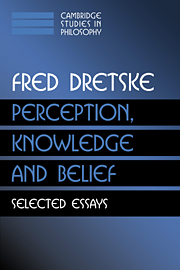Book contents
- Frontmatter
- Contents
- Preface
- Part One Knowledge
- Part Two Perception and Experience
- Part Three Thought and Intentionality
- 11 Putting Information to Work
- 12 If You Can't Make One, You Don't Know How It Works
- 13 The Nature of Thought
- 14 Norms, History, and the Constitution of the Mental
- 15 Minds, Machines, and Money: What Really Explains Behavior
- Index
11 - Putting Information to Work
Published online by Cambridge University Press: 19 December 2009
- Frontmatter
- Contents
- Preface
- Part One Knowledge
- Part Two Perception and Experience
- Part Three Thought and Intentionality
- 11 Putting Information to Work
- 12 If You Can't Make One, You Don't Know How It Works
- 13 The Nature of Thought
- 14 Norms, History, and the Constitution of the Mental
- 15 Minds, Machines, and Money: What Really Explains Behavior
- Index
Summary
Information isn't much good if it doesn't do anything. If the fact that an event carries information doesn't help explain the event's impact on the rest of the world, then, as far as the rest of the world is concerned, the event may as well not carry information. To put it bluntly, in the way positivists liked to put it, a difference that doesn't make a difference isn't really a difference at all. If an event's carrying information doesn't make a difference – and by a difference here I mean a causal difference, a difference in the kinds of effects it has – then for all philosophical (not to mention practical) purposes, the event doesn't carry information.
Surely, though, this is not a serious threat. We all know how useful a commodity information is, how even the smallest scrap can radically alter the course of human affairs. Think about its role in business, education, and war. Or consider the consequences of telling Michael about his wife's passionate affair with Charles. Kaboom! Their lives are never again the same. A small piece of information dramatically alters a part (and – who knows? – maybe eventually the entire course) of world history. In light of such obvious examples, how can anyone seriously doubt the causal efficacy of information and, hence, its relevance to understanding why some things turn out the way they do?
- Type
- Chapter
- Information
- Perception, Knowledge and BeliefSelected Essays, pp. 195 - 207Publisher: Cambridge University PressPrint publication year: 2000



